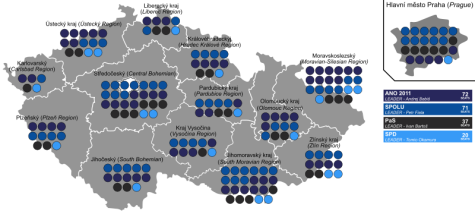Populist Prime Minister of Czech Republic Ousted by a Rare Opposition Alliance
Parties all along the political spectrum combined into two major coalitions in an effort to jointly halt populist momentum in the Czech Republic.
November 28, 2021
“Change is here. We promised it. We will do it,” said opposition leader Petr Fiala when the results of the 2021 Czech legislative elections came out, showing that Fiala’s coalition together with another alliance had successfully joined forces and defeated the current populist prime minister, Andrej Babiš. These two separate alliances, SPOLU and PaS, united against Babiš and his ANO party in a rare opposition effort that overlooked conflicting beliefs to attain a common goal.
When results showed that SPOLU and PaS had won a surprise parliamentary majority, Babiš conceded defeat, stating “that’s life, we understand and accept that” while also branding the opposition effort as a “smear campaign”.
After the 2017 legislative elections, there existed a minority government consisting of Babiš’ ANO and the Czech Social Democratic Party (ČSSD). In the recent 2021 elections, ANO lost 6 of its seats, putting it at 72, while ČSSD lost all of its seats due to a 5% threshold which, for the first time since Czechoslovakia’s disintegration in 1993, it failed to reach.
Leading up to the recent election, ANO polled ahead of SPOLU and PaS, eliciting surprise when SPOLU received the highest number of votes by a razor-thin margin over ANO. The ANO party still won one more seat than the 71 seats won by SPOLU, but, in consideration of the 37 that PaS won, a majority opposition was amassed by the two coalitions.

The Czech Republic’s President Miloš Zeman originally said that he would give the prime ministerial mandate to the candidate of the largest party, not the largest coalition. This, however, would only delay the formation of a SPOLU-PaS coalition government because any new government needs a parliamentary confidence vote, but Fiala’s populist ANO, even with the support of SPD which earned 20 seats, does not have a majority. On October 15th, Babiš declared he would decline any proposal to establish a new government, promising that “[the ANO party] will hand it over to the new coalition” which will be a joint government between SPOLU and PaS. In early November, Zeman eventually stated that he would appoint Fiala the new prime minister.
The opposition’s success in the Czech Republic suggests that the recent flood of populists, who in Central and Eastern Europe have seemed unbeatable, may be receding, possibly due to sentiment that populists like Babiš have caused democracy to deteriorate. Babiš’s defeat in the Czech Republic last week may be a harbinger of trouble for nationalist politicians in other European countries like Hungary, Poland, and Russia who have also damaged democracy. In Hungary, prime minister Viktor Orban has been seen as destructive to democracy and independent media, and until recently, pro-democracy opposition has faced an arduous battle due to the high finances of large parties like those of Orban and Babiš. The combination of several opposition parties into a single coalition in Hungary now threatens Orban’s reelection chances, especially in light of Babiš’s defeat.
Had the opposition not defeated Babiš, European politics would have serenely continued on as before, but his loss has created irrevocable upheaval and doubt in the Czech Republic and the continent as a whole.











